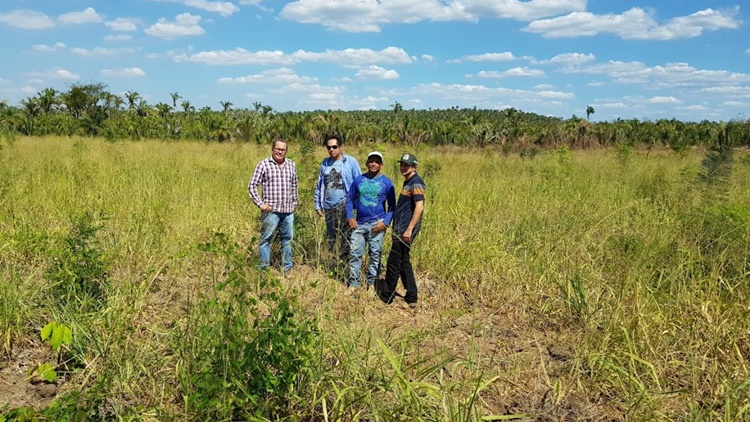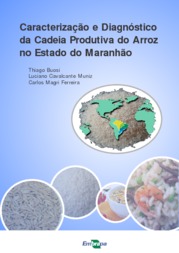Partnership between Embrapa and New Zealand government strengthens family farming in Maranhão
Partnership between Embrapa and New Zealand government strengthens family farming in Maranhão
Providing increased grain productivity and improving the quality of the rice produced by family farmers in the Brazilian state of Maranhão through the dissemination and validation of sustainable crop technologies is the main goal of the project developed by Embrapa in partnership with the government of New Zealand.
Due to last a year, the project establishes the installation of Demonstration Units (DUs) in the Maranhão villages of Igarapé do Meio, Itapecuru Mirim, and Codó. The partnership with their town governments and with other institutions such as the Landless Peasants Movement (MST – Movimento dos trabalhadores Rurais Sem Terras) and Farmer Associations is essential for the good course of the project.
“In such Demonstration Units, the family farmers of the region will have access to the main technological innovations related to upland rice crops, such as news cultivars, plantation techniques, and pest, disease and weed control”, clarifies the project's technical coordinator, Adriano Stephan Nascente, a researcher at Embrapa Rice and Beans (Santo Antônio de Goiás,GO).
For the analyst Carlos Martins Santiago, from the technology transfer area of Embrapa Cocais in Maranhão, in addition to such actions, the project stipulates there will be training courses in Integrated Rice Crop Management for technicians of the region. “Such training events will make technical assistants and extension agents have the knowledge of the new technologies required to instruct family farmers about the main innovations in rice crop management, which will thus ensure that rice plantations are sustainably conducted”.
Another aspect the Embrapa Cocais researcher Guillermo Barbosa Abreu wanted to highlight referred to some techniques, such as foliar zinc sulphate application, that aim at increasing rice nutrient contents and thus improve the dietary quality of the harvested grain.
First actions
In the week from September 18 to September 22, Nascente, Santiago and Guilherme travelled to the countryside of Maranhão state to choose the locations for the Demonstration Units, collect soil samples for physical and chemical analysis, and contact local authorities. During the visits they could talk to the city secretaries of agriculture of Igarapé do Meio, Itapecuru Mirim and Codó, who welcomed the partnership for the activities in the family farmer communities and stressed the importance of ensuring food security for local rural families.
Rice in Maranhão
Rice is a product of major importance in Maranhão in several aspects, especially the social one, due to its important role in food security, and the economic one, due to its potential for income generation.
The state is formed by 217 cities, of which 213 produced rice in the 2015/2016 harvest year. Another characteristic of rice farming in Maranhão is that nearly all the produced rice (98.8%) is found in farmlands that are smaller than 50 ha, which shows the social importance of the crop for the state. In 2016, the average rice productivity was 1,356 kg/ha, much lower than the national average that was of 4,690 kg/ha.
This low productivity is mostly due to the low use of technologies such as improved cultivars, fertilization, and pest, disease and weed control. This shows the opportunity for the incorporation and adoption of technologies already available to improve the productivity and the quality of the rice produced in the state.
This way, the actions developed by the project have the potential to provide significant increments to rice grain yields in Maranhão's family farming, in order to incisively contribute to increasing food production in the rural communities in question, and increase the productivity of the rice cultivated in the DUs, while strengthening technicians' skills to guide farmers on the sustainable cultivation of upland rice in Maranhão.
The project team aims at giving a boost to farmers who realize the benefits of using sustainable rice cultivation technologies in their properties, improving the yield of state upland rice family farming and contributing to the development of sustainable agriculture in Maranhão state.
Additionally, they will write a document with step-by-step instructions to implementa an upland rice plantation using sustainable crop techniques, in order to encourage the replication of the activities developed in other villages in Maranhão.
Villages and communities involved:
Igarapé do Meio: Demonstration Units will be set up and run in the Diamante Negro Settlement Project, where it will benefit over 130 families that were settled and organized into associations by the MST Landless Peasant Movement.
Itapecuru Mirim: Demonstration Units will be set up and run in the Cristina Alves Settlement Project, where it will benefit over 100 families that were settled and organized into associations by MST.
Codó: Demonstration Units will be set up and run in the ITERMA: Montevideo Settlement Project, where it will benefit over 40 families that were settled and organized into associations.
In each region a course on Integrated Upland Rice Crop Managemet will be offered for approximately 30 technicians who work in the town or in surrounding cities.
Next steps
In December 2017, technicians from Embrapa Rice and Beans and from Embrapa Cocais are going to return to the Maranhão vllages to follow up on the soil preparation of the demonstration areas, and once again in January, to sow rice. For each and every activity that takes place in the Demonstration Units, family farmers will be invited to be present and have access to all the technologies developed.
Translation: Mariana Medeiros
Hélio Magalhães (4911 MTb/MG)
Embrapa Rice and Beans
Press inquiries
arroz-e-feijao.imprensa@embrapa.br
Phone number: (62) 3533-2108
Further information on the topic
Citizen Attention Service (SAC)
www.embrapa.br/contact-us/sac/


